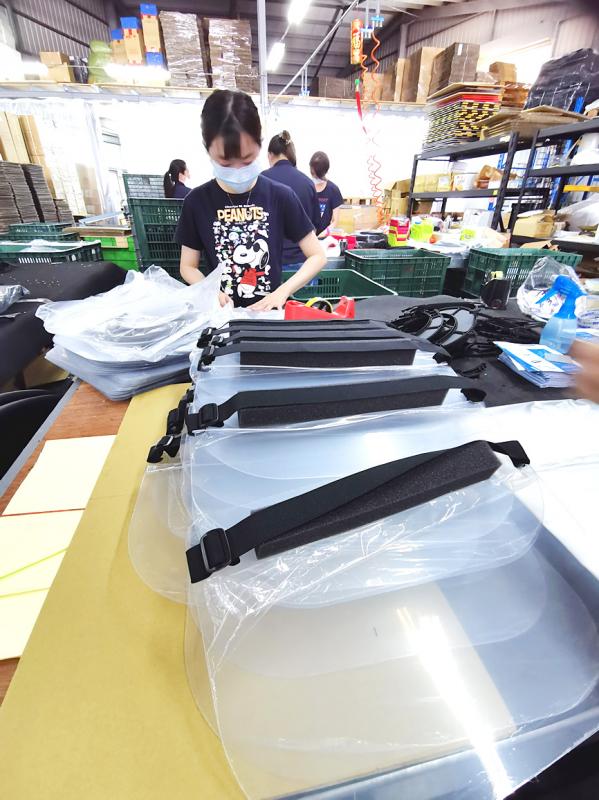Industrial production last month increased 13.93 percent year-on-year as the traditional and tech sectors saw healthy global demand, the Ministry of Economic Affairs’ Department of Statistics said in a report yesterday.
The ministry uses industrial production to gauge output in Taiwan’s five main industries: manufacturing, mining and quarrying, electricity and gas supply, water supply, and architectural engineering.
Manufacturing production, which contributed 90 percent of total industrial production, grew 15.02 percent annually last month, increasing for the 18th month in a row, ministry data showed.

Photo: Wu Chun-feng, Taipei Times
Department of Statistics Deputy Director-General Huang Wei-jie (黃偉傑) said that manufacturing production is often seen as a clear bellwether for Taiwan’s economy, as Taiwan is heavily export orientated.
The machinery equipment and basic metal sectors posted notable production growth last month, up 29.02 and 28.79 percent respectively, reflecting an unusually depressed July last year, and demand from Europe and the US for infrastructure and other projects this year, the report said.
“Infrastructure demand means the countries will need materials to build bridges, etc,” Huang said. “Meanwhile, we are also seeing a lot of factory expansion, which boosts demand for basic metals and machinery goods.”
Automobile and auto parts output grew a robust 22.06 percent annually last month, ministry data showed, but growth in other traditional categories was more modest, with the chemicals industry increasing 9.9 percent and general household products rising 6.49 percent, the ministry said.
Taiwan is known for high-tech products and this sector remained robust throughout the COVID-19 pandemic, thanks to increased demand for electronic products.
The electronic components sector’s output was up 16.8 percent year-on-year, while output of the computer, electronic products and optical products sector rose 5.1 percent, ministry data showed.
In the first seven months of the year, industrial production rose 14.46 percent from a year earlier, while manufacturing production increased 15.48 percent.
The ministry forecast that output in the manufacturing sector this month would be higher than last month, as the global economic recovery continues.
The ministry said 10.6 percent of manufacturers it surveyed recently said they expected production to increase from last month, while 75.8 percent said their production would be flat and 13.6 percent said they expected a drop in production.

With an approval rating of just two percent, Peruvian President Dina Boluarte might be the world’s most unpopular leader, according to pollsters. Protests greeted her rise to power 29 months ago, and have marked her entire term — joined by assorted scandals, investigations, controversies and a surge in gang violence. The 63-year-old is the target of a dozen probes, including for her alleged failure to declare gifts of luxury jewels and watches, a scandal inevitably dubbed “Rolexgate.” She is also under the microscope for a two-week undeclared absence for nose surgery — which she insists was medical, not cosmetic — and is

CAUTIOUS RECOVERY: While the manufacturing sector returned to growth amid the US-China trade truce, firms remain wary as uncertainty clouds the outlook, the CIER said The local manufacturing sector returned to expansion last month, as the official purchasing managers’ index (PMI) rose 2.1 points to 51.0, driven by a temporary easing in US-China trade tensions, the Chung-Hua Institution for Economic Research (CIER, 中華經濟研究院) said yesterday. The PMI gauges the health of the manufacturing industry, with readings above 50 indicating expansion and those below 50 signaling contraction. “Firms are not as pessimistic as they were in April, but they remain far from optimistic,” CIER president Lien Hsien-ming (連賢明) said at a news conference. The full impact of US tariff decisions is unlikely to become clear until later this month

GROWING CONCERN: Some senior Trump administration officials opposed the UAE expansion over fears that another TSMC project could jeopardize its US investment Taiwan Semiconductor Manufacturing Co (TSMC, 台積電) is evaluating building an advanced production facility in the United Arab Emirates (UAE) and has discussed the possibility with officials in US President Donald Trump’s administration, people familiar with the matter said, in a potentially major bet on the Middle East that would only come to fruition with Washington’s approval. The company has had multiple meetings in the past few months with US Special Envoy to the Middle East Steve Witkoff and officials from MGX, an influential investment vehicle overseen by the UAE president’s brother, the people said. The conversations are a continuation of talks that

CHIP DUTIES: TSMC said it voiced its concerns to Washington about tariffs, telling the US commerce department that it wants ‘fair treatment’ to protect its competitiveness Taiwan Semiconductor Manufacturing Co (TSMC, 台積電) yesterday reiterated robust business prospects for this year as strong artificial intelligence (AI) chip demand from Nvidia Corp and other customers would absorb the impacts of US tariffs. “The impact of tariffs would be indirect, as the custom tax is the importers’ responsibility, not the exporters,” TSMC chairman and chief executive officer C.C. Wei (魏哲家) said at the chipmaker’s annual shareholders’ meeting in Hsinchu City. TSMC’s business could be affected if people become reluctant to buy electronics due to inflated prices, Wei said. In addition, the chipmaker has voiced its concern to the US Department of Commerce